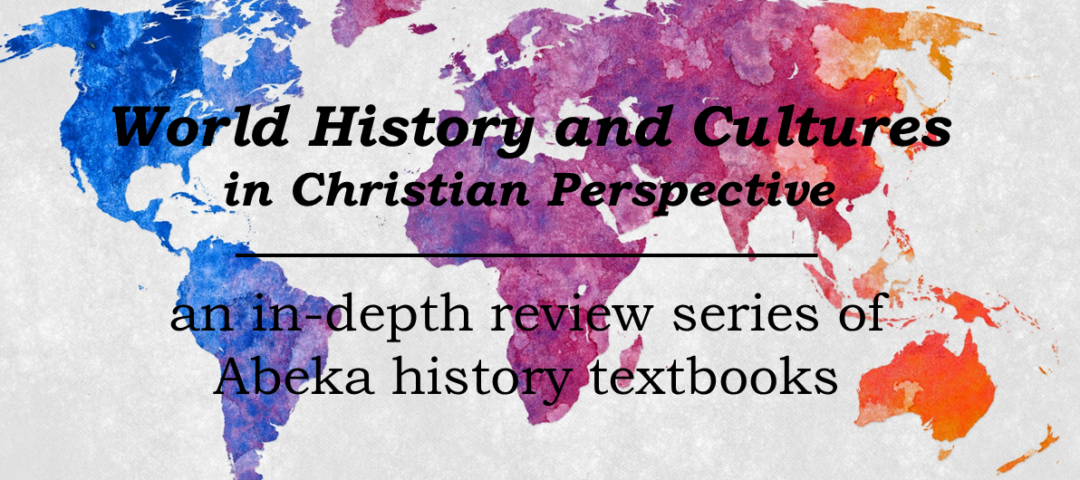I sat down to start working on this week’s World History and Cultures post at 2pm. It is now almost 5– that’s how long it took me to factcheck seventeen pages, not including writing this review.
Inaccuracies:
- Nebuchadnezzar II conquered Jerusalem, not Nebuchadnezzar I.
- Babylonia was not the first empire in the Near East after Sumer, Assyria was.
- Babylon may be one of the oldest cities, but in a credible list of “first cities,” Babylon doesn’t even make it into the top 10.
- Historians note that Assyria used iron weapons most decisively in combat, not the Hittites.
- Whether or not Cyrus or Darius established the Persian postal system is unclear (they claim it’s Darius, evidence seems to point to Cyrus) but the first postal service was in Egypt, not Persia.
- The countries with the most biodiversity and variations in climate and topography are Ecuador, India, Mexico, etc., Israel doesn’t even come close.
- Two of the “main highways of the ancient world” -The King’s Highway from Egypt to Syria, or the Silk Road—completely bypass Israel, with termini in Tyre, Lebanon; Antioch, Turkey; and Damascus, Syria. It was certainly not “the great trade route linking continents, nations, and cultures” when my brief survey found at least eight other trade routes that did so in biblical times.
- Israel was not “the greatest nation in the world around 1,000 BC.” That was the zenith of the Egyptian New Kingdom, for one, and close to the height of Olmec Civilization in Mexico—the Zhou Dynasty also stretched across most of central China at the time, as well.
- Pages 28-33 relates the “history” of Israel as evangelicals and fundamentalists articulate it. If you’d like to dig into this topic, I recommend The Mythic Past: Biblical Archeology and the Myth of Israel by Thomas Thompson.
- The Roman Empire was divided in 285 CE, not 395.
- Salvation in Islam is not attained by reciting the shahadah 125,000 times (?!), or even by the Five Pillars of Islam, which they reference—but by repentance and belief.
- The half sentence we get about the Iranian Revolution is … hummm. So. Bad. If you’d like to understand more about what happened in Iran and what lead to the Revolution, please read All the Shah’s Men: An American Coup and the Roots of Middle East Terror by Stephen Kinzer.
Wild Assertions:
- The Enuma Elish was written “in order to exalt Babylon and its chief god, Marduk” (23).
- Babylonian scientists were “too immersed in the naturalistic superstition of astrology to develop the science of astronomy.”
- “Without laws and a governmental structure to enforce them, it would be impossible for people to live together peaceably.”
- “Justice is the use of authority and power to uphold what is right, just, or lawful. It reflects the principle that every man is responsible for his own actions and should be treated accordingly” (24).
- “Unbelieving critics, including the French infidel Voltaire, ridiculed the Word of God and insisted that no such nation [Hittites] had ever existed.”
- “The name Assyria became synonymous with terror, cruelty, and oppression among all the peoples of the ancient Middle East” (25). (This is also an inaccuracy, since this “reputation” appears among 20th century scholars and has been discredited.)
- “…the ruins of Babylon bear testimony to the judgment of God against the pride, idolatry, and immorality of the once proud city” (26).
- “The Persian Empire prospered for over two centuries, probably because of its tolerant, generally beneficent treatment of God’s people, the Jews” (27).
- “Although the Persian kings practiced the false, pagan religion of Zoroastrianism, they had a much higher regard for the sanctity of law than did the haughty Assyrian and Babylonian monarchs.”
- Moses is “one of the greatest men in world history” (28).
- “Byzantium was increasingly threatened … by the rise of a fanatical, militant new religion in the Arabian Peninsula—Islam” (34).
- “Muhammed combined elements of a corrupted Judaism and a distorted Christianity in a legalistic religion that looked to him as its ultimate authority” (35).
- “Because Islam is such a fanatically anti-Christian faith, the progress of modern Protestant missions in the Middle East has been extremely slow and difficult.”
- Britain took control of Palestine, etc, “in order to prepare these Arab states for independence” (36).
- “…the Middle East will continue to be a center of international tension and conflict as the world nears history’s last great battle, the Battle of Armageddon” (38).
Assumptions:
- Not only does the Bible relay accurate historical information, what it relays indicates the significance and superiority of its contents over other cultures, nations, cities, persons, and events.
***
This was my face as I read this chapter:
I knew when I started WHAC that things were bound to get interesting, and I suspected that their chapter on the “Middle East” was going to be … is there a word that combines “hilarious” and “troubling”?
I think the most important point to highlight about chapter three is this: how much time WHAC gives to certain items is indicative of its point of view. I mentioned above that they see the biblical narrative as not just accurate, but as a source for understanding God’s priorities. If God didn’t mention it in the Bible, then it’s not that important– and if he did, well then it must be incredibly important.
We see this in their section on the Hittite Empire: the Bible exalts the Hittites to a fabled, mythic stature. They’re portrayed as allies of Israel (Uriah the Hittite, Bathsheba’s husband, is one of David’s mighty men, and the Empire is the source for many of the building materials for the Temple), and as powerful allies at that. Consequently, Abeka makes a mountain out of their iron forging ability, even though from the research I did indicates it’s likely the Hittites only had access to a form of wrought iron, which is not that much stronger than bronze. The historians I was reading pointed to Assyria, not the Hittites, as using iron weapons successfully … but that doesn’t align as well with the Bible’s recorded emphasis on the Hittites, so WHAC lies. They also call Voltaire an “infidel” for being skeptical of its existence, which … alrighty then.
Not only that, we also get two entire pages on the Old and New Babylonian Empires and not even a whisper about some of the other empires that existed in the same time frame. It’s obvious from their constant references to Scripture that they’re giving this much space to Babylonia because the Bible does.
Another example is that we get two paragraphs about some missionaries that I feel like I’d never even heard of, even though WHAC was my textbook in highschool … and a single half-sentence on the Iranian Revolution. WHAC spends five pages giving us an “Update” on the modern near east, but one of the most significant events in modern history, something that has had massive consequences on world politics for decades, the Iranian Revolution, gets 12 words while four little-known missionaries get 121. That is literally ten times as much attention.
The text is also incredibly Islamaphobic. I didn’t even know what Islamaphobia was when I was reading this in high school, but it’s no wonder that I thought the worst possible things about Muslims, given what I was told. They make Islam seem beyond absurd– their “explanation” of Islamic theology is reductionist in the extreme as well as being actively deceptive. They claim that Muslims have to repeat the shahadah (“There is no God but Allah, and Muhammad is the messenger of Allah”) 125,000 times in order to be saved from hell, a claim I could find absolutely nowhere else. They also do not correct anything they’ve lied about in the third edition, published 12 years after 9/11.
They’re not just being biased against Islam the way we’ve seen hundreds of our religious and political leaders be over the last 15 years, they’re lying. For all they claim that the 10 Commandments are “universal” and “eternal principles” in this chapter, they must not think that applies to “bear no false witness against thy neighbor.”
Students are required to memorize and regurgitate the text’s Islamaphobia, as well. Of the 78 review questions, 28% ask students to answer questions like “Describe the origin of Islam and its effect on the Middle East” or “define Islam.” The answers: “Islam’s fanatical anti-Christian beliefs don’t allow missionaries to spread the gospel” and “Islam is a man-made religion that teaches people to rely on their own efforts” (35).
***
I don’t want to spend too much time on this, but I did want to direct your attention to one of the “wild assertions” above:
“Justice is the use of authority and power to uphold what is right, just, or lawful. It reflects the principle that every man is responsible for his own actions and should be treated accordingly.”
If you’ve ever wondered why Christians are so comfortable completely abdicating their responsibility to love their neighbor, or are completely oblivious to God’s emphasis on liberation, or believe that the United States has every right to slaughter Black men and women and call it justice–
This is why.
***
Lastly, I want to bring out something that may seem rather minor compared to the flagrant Islamaphobia, Eurocentrism, and racism in this chapter. When talking about the Persian Empire, they assert that “Darius established the world’s first postal service over the numerous roads he built to connect the empire.” This point gets six more lines, including a quote from Herodotus.
They completely ignore that there’s some uncertainty on who, exactly, expanded couriers into an early mail system. Many historians say it was Cyrus, and use a quote from Xenophon, a Greek historian, to back them up. Some others say no, it’s Darius, and argue the Herodotus quote (“neither snow nor rain…”) applies to his reign. Most of what I was reading say things like “It’s unclear whether…” when discussing this subject, and relay the above information.
World History and Cultures, however, can’t do that.
In the authors’ framework, there is nothing uncertain about history. There is no place for doubt, no place for questions, no place for exploration and growth. In a previous chapter they made the claim that a single man near-miraculously “cracked the code” of Sumerian cuneiform, instead of rightly attributing it to many scholars and the work of decades. In their world, there’s no slow progress from not knowing to we think this is right, at least the best answer we have right now. We are haplessly ignorant until God reveals the answers, and then those answers are incontrovertible.
This perspective even gets projected onto their philosophical opposition: Voltaire’s skepticism isn’t the result of a person who doesn’t believe in things there’s no evidence for, and would have gladly changed his mind if he’d been alive in 1906, when Winckler uncovered Hattusa. It’s not that historians study and grow and learn and expand knowledge; instead, they “deny God’s truth” because they’re “infidels” until God sees fit to “vindicate” the Bible.
This is why I’m arguing that World History and Cultures doesn’t exist to educate, but indoctrinate. They’re not interested in giving students a sense of wonder, curiosity, or learning. All they want is to make sure students stay inside the fundamentalist ideological box.




